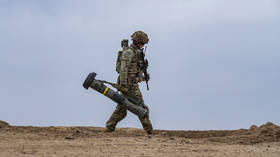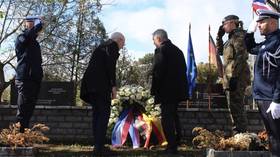‘Disappointed but not surprised’ – Serbia reacts to US arming separatists

Belgrade is not happy with Washington’s decision to sell anti-tank missiles to the breakaway province of Kosovo and intends to strengthen its military in response, Serbian Defense Minister Milos Vucevic said on Friday.
The US ambassador in Belgrade, Christopher Hill, informed Serbian President Aleksandar Vucic of the potential sale during their meeting on Thursday. The State Department has greenlit the deal, involving 246 weapons worth an estimated $75 million.
“The US is a long-time ally of Pristina, so we are not surprised by this move, but we are obviously disappointed and we have expressed our displeasure openly,” Vucevic told the daily Kurir.
While Serbia can’t change US policy, it will respond by bolstering its military capabilities, he added.
NATO bombed Serbia for 78 days in 1999 on behalf of ethnic Albanian separatists in Kosovo. The province was then placed under a UN provisional government while Security Council Resolution 1244 guaranteed Serbian sovereignty. Ethnic Albanians declared independence in 2008 with US support, but Serbia has never recognized the move, despite continued pressure from the West.
Vucic has vowed “never” to recognize Kosovo but also to strive for EU membership, which has made recognition an explicit condition of admission.
In its approval of the sale of Javelins, the State Department described Kosovo as “an important force for political and economic stability in Europe.”
After his meeting with Hill, Vucic said he was “deeply disappointed” by the US move, adding that he “confirmed our dedication to preserving the peace and stability in the region and strengthening the friendship and cooperation between Serbia and the US.”
Vucic has previously insisted that Serbia would not allow “another pogrom” in Kosovo – referring to the 2004 anti-Serb riots that NATO peacekeepers tolerated for almost a week – and has repeatedly complained about the West turning a blind eye to Pristina’s repressive moves against the remaining ethnic Serbs in the breakaway province.
The missile deal still requires approval by the US Congress. Congresswoman Claudia Tenney, the New York Republican who chairs the Congressional Serbian Caucus, has already condemned it as “misguided and dangerous” and said she would oppose it.
The FGM-148 Javelin is a portable anti-tank missile with infrared guidance, armed with a high-explosive warhead. The US has supplied them in large quantities to Ukraine since 2019, and they were reported to be in short supply as of mid-2022. They are jointly produced by Lockheed Martin and Raytheon Technologies, the latter of which used to employ the current US Secretary of Defense Lloyd Austin on its board of directors.













